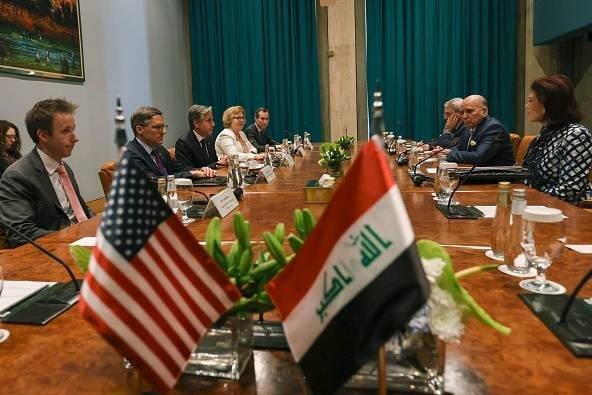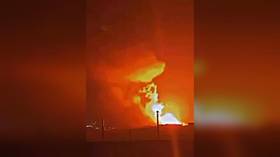
An Iraqi Kurd in Erbil, capital of northern Iraq’s autonomous Kurdish region, decorates a car with the Kurdish flag and a poster bearing the image of Iraqi Kurdish leader Masoud Barzani urging people to vote in the upcoming Sept. 25 referendum on independence for Iraqi Kurdistan, Aug. 30, 2017. (SAFIN HAMED/AFP/GETTY IMAGES)
Washington Report on Middle East Affairs
Special Report
By Yavuz Baydar
AS THE CLOCK ticks toward the referendum on Iraqi Kurdistan’s independence, tensions mount rapidly in neighboring countries. Both Tehran and Ankara will do their utmost to have the September vote blocked, annulled or at least postponed indefinitely.
This joint stand became clear during a top-level Iranian military visit to Ankara by the chief of the general staff of the Iranian armed forces, Gen. Mohammad Bagheri, escorted by the commanders of the Islamic Revolutionary Guard Corps and the Border Protection Troops. It was the first time since 1979 that an Iranian top general visited Turkey. The meeting exemplified how significantly the regional balances have been rattled.
“If such a thing happens, it will trigger a new tension and will affect the neighboring countries negatively,” Bagheri said about the upcoming Kurdish vote. “Therefore, the two countries insist that it shall not be possible and should not be conducted.”
He added that Ankara and Tehran had agreed on joint operations and intelligence sharing. This is very bad news, not only for Kurdistan Regional Government (KRG) President Masoud Barzani, who is banking on the referendum securing his future, but also for the Patriotic Union of Kurdistan (PUK), the second most powerful player on the Iraqi Kurdish stage after Barzani’s Kurdistan Democratic Party (KDP), which is the engine behind the referendum. Reports have circulated that the Iranian military warned the KRG about severe consequences should the vote go on.
Barzani in June announced plans for a referendum on independence on Sept. 25, with voting expected in Kirkuk and three other areas. Kurdish officials have said the vote wouldn’t lead to an automatic declaration of independence, but would improve the Kurds’ position in talks with the government in Baghdad regarding self-determination.
It is apparent that Tehran is on the same page as Ankara about the anxiety of a declaration of Kurdish independence. Both countries have large Kurdish populations: There are about 8 million Kurds in Iran and more than 14 million in Turkey. Both groups have, for decades, acted to carve a path to independence or secession and have been watching with intense attention how their brethren in Iraq and Syria push for what they have been dreaming of.
Both Ankara and Tehran see Kurdish self-rule as a threat to their foreign policy. Ankara is also concerned that a yes vote would trigger a new independence/secession push among its own Kurds. Tehran, however, might have even more to worry about. It was obviously irked by the Israeli government’s support for the Iraqi Kurdish intentions. A partition of Iraq through a vote would weaken its hand by a diminished Baghdad and demolish a new regional policy architecture it had built as the Syrian crisis deepened.
What will happen if Barzani does not blink? His administration made it clear to Iranians that the vote was decided collectively by the major political forces in Iraqi Kurdistan. The only exception was the Gorran Movement, which argued that the referendum must have a mandate from parliament, and Barzani can take new steps to put it in play, which could cause further trouble if the PUK were to pull out of the decision.
Turkey, on the other hand, may be happy to build on the Iranian frustrations and wait a little more before intervening to call on Barzani to postpone the vote. This would leave Barzani to persuade Ankara and Tehran that the result is non-binding and that they both need a strong leader like him, with the promise that he would not take any drastic steps against their basic national interests.
The more dramatic scenario is that Turkish President Recep Tayyip Erdogan goes along with “severe measures”—as Iranians expressed it to Iraqi KRG—simply because Kurdish advances in general in the region pose a much more serious threat to his political aims than keeping a distance from Syrian President Bashar Assad. Iran will continue to back Assad no matter what.
There will be a lot of interesting manoeuvring related to the Kurdish referendum in the coming weeks.
Yavuz Baydar is a journalist based in Istanbul. A founding member of the Platform for Independent Journalism (P24) and a news analyst, he won the European Press Prize in 2014. He has been reporting on Turkey and journalism issues since 1980. Copyright ©2017 The Arab Weekly. Distributed by Agence Global.



